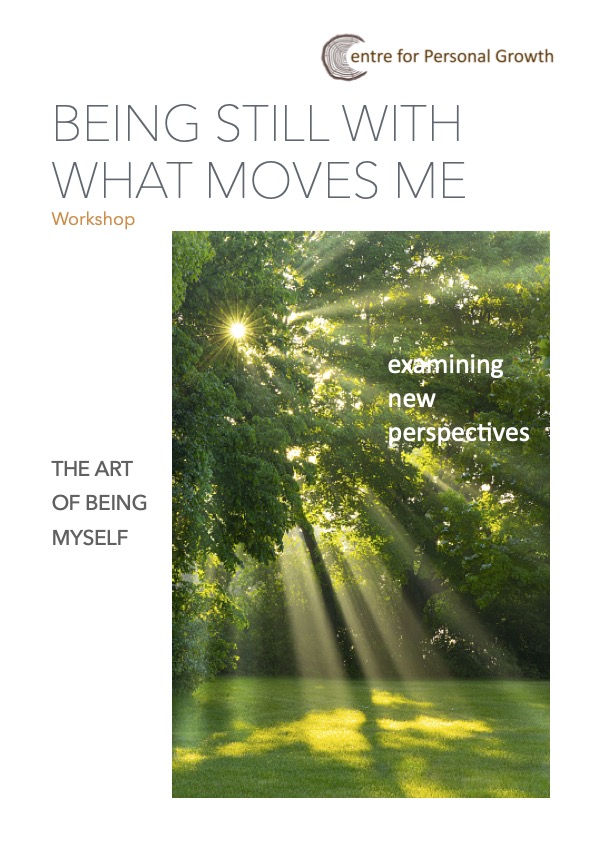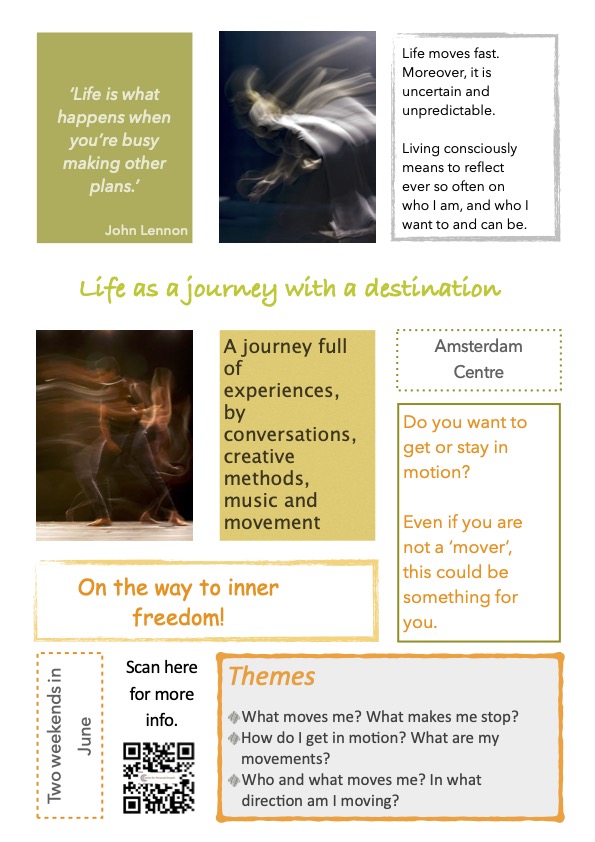

Click here for more information

Existential Coaching & Logotherapy
‘The two most important days in your life are the day you are born, and the day you find out why.’ Mark Twain
This statement’s departure point is that we all have a task in life, though it may remain hidden from us for a long time.
The workplace may offer a solution here, and the concept of purpose leadership seems to respond to this.
Not without reason. If we experience our work as meaningful, we not only work more diligently and efficiently, it also appears to be better for our well-being.
But what is actually meant by purpose leadership? Isn’t it a pleonasm, like the round ball? Isn’t purpose already embedded in the concept of leadership, like in the ball, which is round by definition?
Purpose springs from your identity, the essence of who you are. Your purpose connects your talents with your passion, it’s the calling or mission that the lucky ones among us discover in the course of their live.
When it comes to leadership, we generally have a clear notion of what it is about. ‘Modern’ leaders stimulate and inspire from their internal conviction. Over 30 years of ‘research’ among my clients often yields similar names, such as Dr Martin Luther King, Nelson Mandela, Mahatma Gandhi, and more recently, Desmond Tutu. People with a clear purpose.
The fact that the eloquence of ‘leadership’ without the adjective ‘purpose’ has eroded is undoubtedly related to the tension in which the leaders of modern organisations find themselves. In many cases, the organization’s purpose has made way for survival instincts and the pursuit of profit, and leaders are expected to prolong that objective.
Working from his purpose in such context requires the leader’s courage. There is a high chance his calling will clash with the organization’s desire to survive. After all, listening to one’s calling means raising pressing issues.
The pressing issue becomes powerfully evident in ‘The Good Ancestor, How to Think Long Term in a Short-Term World’ by Roman Krznaric (2020).
According to him, we – the rich countries – have colonized the future by treating it as a distant outpost where we can dump our ecological and technological risks. Future generations are by nature powerless; they have no say in what they inherit from us. Our legacy is their starting point, just as we had to build on the legacy of our ancestors, the constructive ones, such as agricultural and medical discoveries, and the destructive ones, such as colonization and slavery. In short, Krznaric’s advice is to think about the consequences of our actions for future generations. Shareholder value and short-term thinking must be abolished and replaced by thinking seven generations ahead.
Now, that is Purpose!
Instead of an adjective, leadership demands responsibility. True leaders hold themselves accountable for the future impact of their own actions, those of their team and/or their organisation!
This rediscovered leadership, therefore, requires the courage to do things differently. Instead of setting a goal by planning from the present to the future, it asks to plan backwards, from the future to the present…
It may sound strange at first, but planning from the future is not strange to us. We do it several times a week. For example, before a meeting at 8 o’clock the following day, we set the alarm by calculating backwards what time we have to get up. Considering the meeting time, we plan backwards: travel time, the time we need before leaving home (shower, dress, breakfast, etc)…
So, let’s re-evaluate leadership by asking impactful questions. Questions like: ‘How do I (or we, as a team or a company) want to be remembered by future generations?’ ‘How do we want them to judge our legacy?’ ‘From what values do we want to act?’
Do you want to elaborate on this? Please get in touch with us via info@poweredbymeaning.eu
Picture: Kristopher Roller
However, teamwork is complex in itself …
In a competitive world, there is competition between and within teams.
“Nothing wrong with that,” you might think. After all, competition is a significant driver of success!
True! As long as the common focus remains on team performance!
However, competition often degenerates into an internal elbowing-work where members out-maneuver each other and are more focused on their own than the team’s success. The “we” consciousness of complementing each other, as well as mutual attention and respect are lost.
Here, the perspective of shared values and goals has disappeared, attention and energy have shifted from an external to an internal focus. The attention for mutual results got lost, and competition has become counterproductive!
How differently would a team function if the internal dynamics followed the principles of improvisational theatre:
– Position yourself next, instead of opposite to the other. Respond with ‘Yes, and…’ (instead of ‘No, but…’).
– We solve the problem together!
– We let each other shine!
– Making mistakes is part of the game. We are jointly responsible for them.
The prerequisite for this is that the members have the same attitude towards the team, that they share and live the raison d’être of the team, the why and wherefore of its existence. In other words, if the members believe in their shared identity and meaning.
When teamwork builds on these unifying values, individual competencies and perspectives come into play. The results-oriented focus acts as a growth accelerator, both for the individual members and the team as a whole.Contact us if you want to better leverage your team’s potential.
15 December 2021
Even though we could see this wave coming, we are now looking for the sunny moments in these dark days.
We are often at odds with ourselves and our patterns when on our own. We are angry and disappointed in ourselves and the world.
Sometimes it hits us unexpectedly. A sudden farewell, an unexpected dismissal, an abrupt illness, yet another wave…
Sometimes it arises insidiously. With an increasing number of conflicts, a feeling of isolation, the sensation of burn-out or bore-out…
Whatever the case, the past, expectations and obligations feel more and more like a prison.
You realise that you can no longer go on like this. Suddenly it doesn’t work for you anymore … life seems more and more like survival.
Maybe it’s time to reinvent yourself. Time for your mental booster!
With some distance from yourself and your situation, you look at the world from a different perspective, and it will look different.
And how you look outside has repercussions on how you look inside and how you see yourself.
A reassessment of your perception and appreciation of your situation makes you a different person.
Let’s invest in a new beginning, one in which the past does not slow down but rather accelerates.
To choose your own path with new energy!
As an existential coach and logotherapist, I will accompany you on your way.
28 November 2021
Each one of us was ‘thrown into this world’.
No one has had a say in the location and time of their birth, nor their parents’ ethnic and socio-cultural backgrounds. We have to live with it and make the best of it…
Nevertheless, we all can distance ourselves from ourselves to develop an awareness of our identities and the roles and (im)possibilities that go with them.
However, self-distancing is undoubtedly more difficult for some than others because of our individual starting points.
Kierkegaard says life can only be understood backwards; but it must be lived forwards.
That is true, of course, but it does not mean that life is pure improvisation.
Setting goals is a well-known way of giving direction to life and the various roles we (want to) play in it. However, life experience teaches us that there comes a time when we have to take account of our role fulfilment, evaluate it and ask ourselves whether the sum of our goals has led to the role we wanted to play in life.
As parents, we ultimately see what has become of our children and what bonds they have with each other; as an immigrant, one considers his integration process; as adults, you look at what kind of student you have been; as retirees, we evaluate our role as a colleague or leader.
Based on the above, in Logotherapy & Existential Analysis by Viktor Frankl we focus on values rather than goals. This is based on the premise that essential goals find their origin in our (often unconscious) values.
The more we are aware of what is essential to us, our values, the better we can shape our life (forwards) and the roles we want to play in it to conclude (backwards) that we have at least played them consciously.
In this way, as a Logotherapist, I hope to support a conscious and responsible way of life.Don’t hesitate to get in touch with me if you would like to discuss your way of fulfilling your roles.
4 November 2021
The desire for a happy and meaningful life implies the danger that we seek meaning in being happy.
Huh?
So, what is the difference between happiness and meaning?
That happiness cannot be bought may be an open door. Many purchases, however, are inspired by the desire to experience a moment of happiness. The lovely dress, the cool watch, the ice cream …. fill in the blank.
In a time when everyone is their own happiness’s blacksmith, and we are constantly showcasing our euphoria, we soon find ourselves caught up in the rat race of “who’s happiest here?
No matter how much we want it, happiness doesn’t get planned. Instead, it is a byproduct of the moments we are truly absorbed in something.
Too much wishing hinders us from finding what we really need.
Whereas happiness is more focused on the self, on receiving and having, meaning is focused on giving, on the relationship with something, with others and the other.
Meaning thus arises not when we get what we want but when we live our values and realize relevant goals based on them. Meaning does not arise within us but between us and something or someone else.
Victor Frankl sees meaning as something objective. Meaning arises when we make a change in the world based on our values. No matter how small or large it may be.
From Logotherapy & Existential Analysis, we work with your values to function from your actual being and be able to do that which ultimately makes you happy.